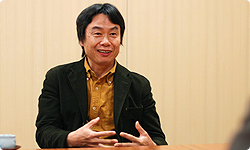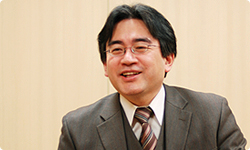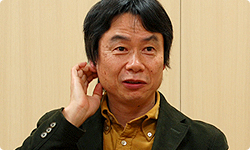1. On the creation of bridge-building games
What? Am I the only one being interviewed today?
Yeah.
Where’s the producer, Mr. Aonuma?1 Actually, there is one more producer behind Link’s Crossbow Training besides Mr. Aonuma. 1 Eiji Aonuma was involved in The Legend of Zelda: Ocarina of Time, and the following Zelda series. He is affiliated with the Entertainment Analysis and Development Division at Nintendo Co., Ltd.
Mr. Tezuka2 is also a producer, right? 2 Takashi Tezuka has been involved in the development of the Super Mario series, the Yoshi series, the Animal Crossing series, and numerous other games. He is the General Manager of the Entertainment Analysis and Development Division at Nintendo Co., Ltd.
Until now, it had been a long time since Mr. Tezuka has had anything to do with Zelda, and I thought it would just be better if he were here too, since I might not be able to answer all of your questions. (laughs)
(laughs) For now, rather than hearing too much about the details of the game, I’d like to ask you what sort of image you had in mind when creating Link’s Crossbow Training?
I see. Well, where should I start? I’ve always been into "first-person shooting"3 (FPS)-style games, 3D games in which you can walk around freely and see things from your own point of view. 3 ‘First-person shooting’ games are a kind of shooting game in which you can move freely in space from your own point of view.

And what is the point of that?
I think it is more comfortable, more natural. We are creatures of habit. We don’t look at our feet when we’re walking around, and we’re always trying desperately to take in the scenery while we’re living our lives. So, even in these games I want people to be able to get really into the 3D geography, so it feels like you’re really there, since I think it’s a really natural thing to be able to look around while you’re walking. At first when we were developing Legend of Zelda: Ocarina of Time4, I even proposed using a first-person perspective. 4 The Legend of Zelda: Ocarina of Time, part of the Legend of Zelda series, was a 3D game for Nintendo 64, and was released in December 1998.
Ocarina of Time from a first-person perspective!?
I thought that might surprise you! (laughs) I thought that the FPS system would be the best way of enabling players to take in the vast terrain of the Hyrule Field. Besides, by not having the player’s character on the screen, we can spend more time and machine power on creating enemies and the environments.
During the Nintendo 64 era you had to keep hardware limitations in mind, didn’t you?
Well, although I had originally planned to make a game with a first-person perspective, the idea of having a child Link in the game was born, and then it became necessary for the hero to be seen on screen.
I see. So, if the hero isn’t visible on screen, it’s really hard to tell the difference between the adult Link and the child Link, right?
That, and also the fact that it’s a total waste not to have Link visible on screen when he is so cool looking! (laughs) So, for the reasons I just mentioned we decided to have the hero visible in Ocarina of Time, but I had always thought that FPS games which you could operate from your own view point were really interesting, so I was proactively supporting such projects as the GoldenEye 007 5 game to move forward. 5 GoldenEye 007’, a 4-player gun action game with 3D capabilities was released for the Nintendo 64 in August 1997
While there are people like you, Mr. Miyamoto, who find these FPS games to be really fun, there are, on the other hand, people who feel FPS games are too difficult. I think that quite a lot of Japanese people feel this way – why do you think this is?
I really don’t know what the reason could be.
I don’t share this opinion but some say that Japanese and Westerners would have different abilities when it comes to grasping 3D games, since people who were traditionally hunters would have a better understanding of using space, whereas people who were traditionally farmers might not.
So I guess my ancestors were hunters (laughs). But don’t get me wrong, I’m really no expert at FPS games. You can get beat in a second, but I think they’re really fun.
It seems that you’re always in tune with what you find enjoyable.
Ha ha! Yeah, you can read me like a book!
For example, the idea for Wii Fit was born because you found the simple act of weighing yourself every day enjoyable, and similarly, the creation of a game in the FPS genre was a reaction to your internal sensor telling you that it would be fun.

If there is something simple which someone can find enjoyable, the same joy can be experienced by anyone on earth, I believe. That’s what I always have in mind when I am creating games. For example, when we were working on Wii Sports, Americans kept telling me that there was no way that games this simple would sell in the States. When Wii Sports finally went on sale though, the games included appeared to have even stronger appeal in the US than they did in Japan. When you see a phenomenon like that occur right in front of you, you start to see that there really isn’t any difference in what Asians or what Westerners find enjoyable.
So, in order to show a lot of different people how much fun FPS games are, you created Link’s Crossbow Training.
Right.
I can understand why you say you wanted to expose more people here in Japan to FPS games, but the game was released in the US, where there already are a lot of people who are into FPS games, right?
Well, even in the US, as in Japan, there are people who used to be into gaming, but don’t play anymore, or just aren’t into FPS games.
Well I’ve certainly heard from an American reporter I’ve spoken to how much trouble he has been experiencing in playing FPS games (laughs).
Well first of all, FPS games were originally shooting games. You couldn’t scroll, you played on a level surface, and I think a lot of people really liked that style of game.
Back then, it had nothing to do with age; both kids and adults could enjoy these shooting games. Some people were even reminded of those pop-gun games they used to play at carnivals.
Even when you go to an amusement park today you can find target practice games. There’ll be some Wild West set-up where your enemies hide behind a rock and you take shots at a target. It seems really simple, but when you try it you see that it’s really fun. But the gaming world has become more and more complicated to the point that people no longer think of it as being accessible.

During the Nintendo 64 era, when GoldenEye 007 came out, even in Japan there seemed to be symptoms indicating the likely spread of the FPS genre. But although the popularity of those games began peaking in the US soon after that, I think that there was still not much progression in Japan among people who enjoy playing video games.
In the US, various types of FPS games made for PCs slowly began to be released on home consoles. However, in Japan, there had been no basis for FPS-style games, and advanced games just kind of sprung up suddenly. I think it was our responsibility to continue releasing fun FPS games to the public to keep them engaged and interested though...
There’s a really big difference between the simple shooting games and the advanced FPS games, isn’t there? I think that although a lot of people would find the FPS games really fun, many have this image that it’s really hard to bridge the gap in difficulty between the two.
Yeah, and I really felt there was room for a game that would bridge that gap, which is why I created Link’s Crossbow Training. Since you use the Wii Remote to aim, it’s a really comfortable way of playing an FPS game.
Just out of curiosity, and since there’s no reason for you to be studying English or training your brain, why did you use the English word “training” in the title?
(Laughs) Because something like “Link’s Crossbow Classroom” sounds a little funny, don’t you think? Since it is a kind of introduction to FPS games, we were originally thinking of calling it “Introduction to Wii Zapper”, but then we decided that people might get that confused with “Introduction to Wii” (Introduction to Wii is the Japanese title for Wii Play), and we didn’t want that to happen. Also, if we had given it a name like “The Legend of Zelda: Phantom Crossbow”, it would have seemed like a grand-scaled sequel in the Zelda series, and we didn’t want it to be misinterpreted as such. That’s why, in the end, we went with “training” for the title.
When I hear a story like that, that’s when I really get a feel for the depth of the gaming world.
Well that’s what you’d expect from the creators of Zelda (laughs).